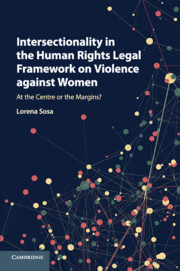 Intersectionality in the Human Rights Legal Framework on Violence against Women
Intersectionality in the Human Rights Legal Framework on Violence against Women Book contents
6 - Empirical Case in Europe: RomaniWomen and Domestic Violence
from III - Intersectionality in Practice
Published online by Cambridge University Press: 25 October 2017
Summary
The separation of state and ethnicity precludes any legal or governmental recognition of ethnic groups, or any use of ethnic criteria in the distribution of rights, resources, and duties.
Will KymlickaIntroduction
This case study empirically explores the laws and policies on Intimate Partner Violence (IPV) in Spain from an intersectional perspective, in relation to Romani women. The European Court of Human Rights (ECtHR) has referred to the Roma as a ‘vulnerable group’. They constitute the largest minority in Europe, living in a situation of extreme inequality, marginalisation and exclusion. Their social situation constitutes one of the ‘most pressing developmental challenges’. Several studies have addressed the gender dimension of the unequal position of Roma.
One of these reports highlights the ‘multiple discrimination’ that Romani women suffer based on their gender and ethnicity, explicitly adopting an ‘intersectional approach’ and using ‘intersectionality as analytical tool’. Yet so far, no official study elaborates on what such an ‘intersectional approach’ entails theoretically and methodologically. This case study, focusing on both aspects, is thus in that sense, a useful addition.
Spain, party to the Convention on the Elimination of All Forms of Discrimination against Women (CEDAW) and the Convention on Preventing and Combating Violence Against Women and Domestic Violence (Istanbul Convention) and having adopted comprehensive legislation and policies on IPV, is the country with the largest Roma population in Western Europe. Within Spain, the majority of Roma live in Andalusia, more precisely, in the province of Granada. This study focuses on Spanish Romani women (‘gitanas’) from Almanjayar, a urban yet marginal area where a very large Romani community is settled with only a small non-Roma population.
In this study, I used a qualitative approach, conducting face-to-face semi-structured interviews with victims of IPV and women from the Roma community. I interviewed members of the judiciary, the police and service providers from specialised centres on IPV, non-specialised service providers located in the neighbourhood and Roma civil associations providing support to the community.
- Type
- Chapter
- Information
- Intersectionality in the Human Rights Legal Framework on Violence against WomenAt the Centre or the Margins?, pp. 173 - 204Publisher: Cambridge University PressPrint publication year: 2017
